OCZ Vector (256GB) Review
by Anand Lal Shimpi on November 27, 2012 9:10 PM ESTTimes are changing at OCZ. There's a new CEO at the helm, and the company is now focused on releasing fewer products but that have gone through more validation and testing than in years past. The hallmark aggressive nature that gave OCZ tremendous marketshare in the channel overstayed its welcome. The new OCZ is supposed to sincerely prioritize compatibility, reliability and general validation testing. Only time will tell if things have changed, but right off the bat there's a different aura surrounding my first encounter with OCZ's Vector SSD.
Gone are the handwritten notes that accompanied OCZ SSD samples in years past, replaced by a much more official looking letter:
The drive itself sees a brand new 7mm chassis. The aluminum colored enclosure features a new label. Only the bottom of the SSD looks familiar as the name, part number and other details are laid out in traditional OCZ fashion.
Under the hood the drive is all new. Vector uses the first home-grown SSD controller by OCZ. Although the Octane and Vertex 4 SSDs both used OCZ Indilinx branded silicon, they were both based on Marvell IP - the controller architecture was licensed, not designed in house. Vector on the other hand uses OCZ's brand new Barefoot 3 controller, designed entirely in-house.
Barefoot 3 is the result of three different teams all working together. OCZ's UK design team, staffed with engineers from the PLX acquisition, the Korea design team inherited after the Indilinx acquisition, and folks at OCZ proper in California all came together to bring Barefoot 3 and Vector to life.
The Barefoot 3 controller integrates an unnamed ARM Cortex core as well as an OCZ Aragon co-processor. OCZ isn't going into a lot of detail as to how these two cores interact or what they handle, but multi-core SoCs aren't anything new in the SSD space. A branded co-processor is a bit unusual, and I suspect that whatever is responsible for Vector's distinct performance has to do with this part of the SoC.
Architecturally, Barefoot 3 can talk to NAND across 8 parallel channels. The controller is paired with two DDR3L-1600 DRAMs, although there's a pad for a third DRAM for use in the case where parity is needed for ECC.
Hardware encryption is not presently supported, although OCZ tells us Barefoot 3 is more than fast enough to handle it should a customer demand the feature. Hardware encryption remains mostly unused and poorly executed on client drives, so its absence isn't too big of a deal in my opinion.
OCZ does its own NAND packaging, and as a result Vector is home to a sea of OCZ branded NAND devices. In reality you're looking at 25nm IMFT synchronous 2-bit-per-cell MLC NAND, just with an OCZ silkscreen on it. There's no NAND redundancy built in to the drive as OCZ is fairly comfortable with the error and failure rates at 25nm. The only spare area set aside is the same 6.8% we see on most client drives (e.g. a 256GB Vector offers 238GB usable space in Windows).
| OCZ Vector | |||||
| 128GB | 256GB | 512GB | |||
| Sequential Read | 550 MB/s | 550 MB/s | 550 MB/s | ||
| Sequential Write | 400 MB/s | 530 MB/s | 530 MB/s | ||
| Random Read | 90K IOPS | 100K IOPS | 100K IOPS | ||
| Random Write | 95K IOPS | 95K IOPS | 95K IOPS | ||
| Active Power Use | 2.25W | 2.25W | 2.25W | ||
| Idle Power Use | 0.9W | 0.9W | 0.9W | ||
Regardless of capacity, OCZ is guaranteeing the Vector for up to 20GB of host writes per day for 5 years. The warranty on the Vector expires after 5 years or 36.5TB of writes, whichever comes first. As with most similar claims, the 20GB value is pretty conservative and based on a 4KB random write workload. With more realistic client workloads you can expect even more life out of the NAND.
Despite being built on a brand new SoC, there's a lot of firmware carryover from Vertex 4. Indeed if you look at the behavior of Vector, it is a lot like a much faster Vertex 4. OCZ does continue to use its performance mode that enables faster performance if less than 50% of the drive's capacity is used, however in practice OCZ seems to rely on it less than in the Vertex 4.
The design cycle for Vector is the longest OCZ has ever endured. It took OCZ 18 months to bring the Vector SSD to market, compared to less than 12 months for previous designs. The additional time was used not only to coordinate teams across the globe, but also to put Vector through more testing and validation than any previous OCZ SSD. It's impossible to guarantee a flawless drive, but doing considerably more testing can't hurt.
The Vector is available starting today in 128GB, 256GB and 512GB capacities. Pricing is directly comparable to Samsung's 840 Pro:
| OCZ Vector Pricing (MSRP) | ||||||
| 64GB | 128GB | 256GB | 512GB | |||
| OCZ Vector | - | $149.99 | $269.99 | $559.99 | ||
| Samsung SSD 840 Pro | $99.99 | $149.99 | $269.99 | $599.99 | ||
OCZ is a bit more aggressive on its 512GB MSRP, otherwise it's very clear what OCZ views as Vector's immediate competition.


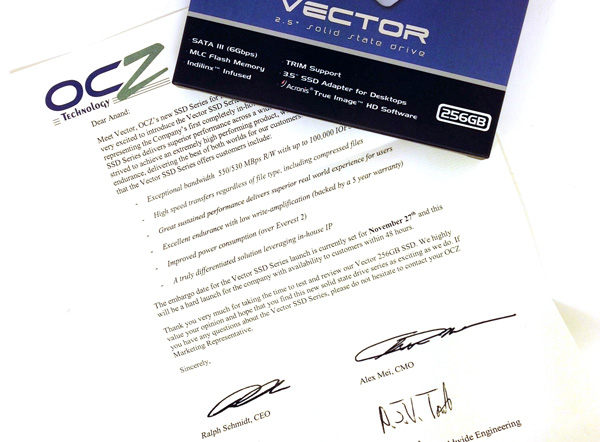
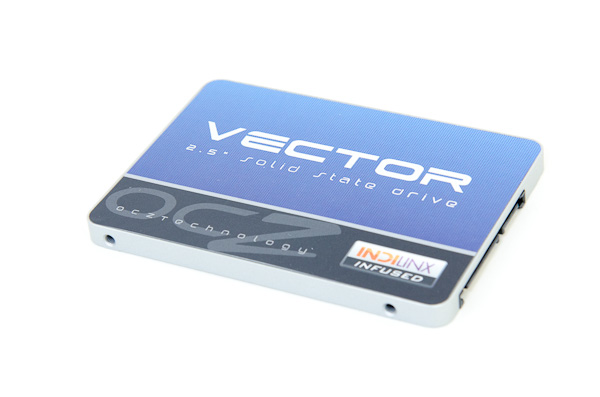
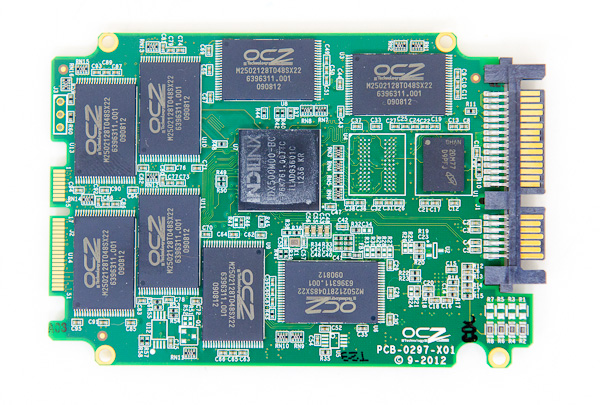
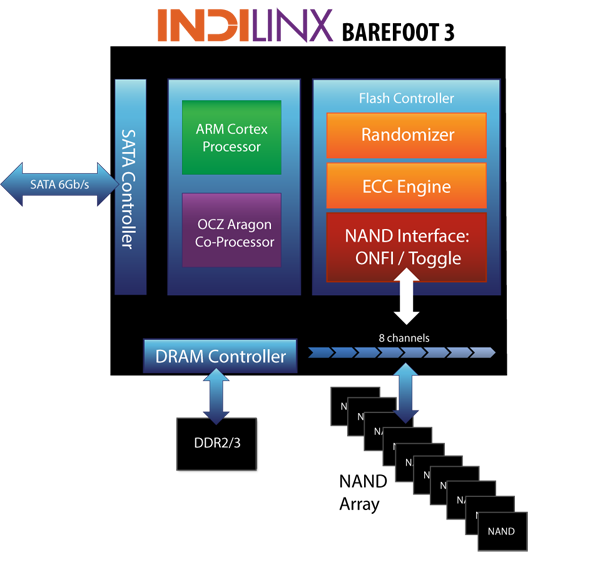
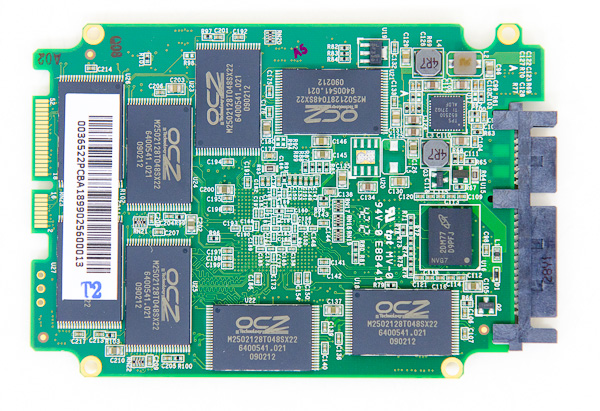
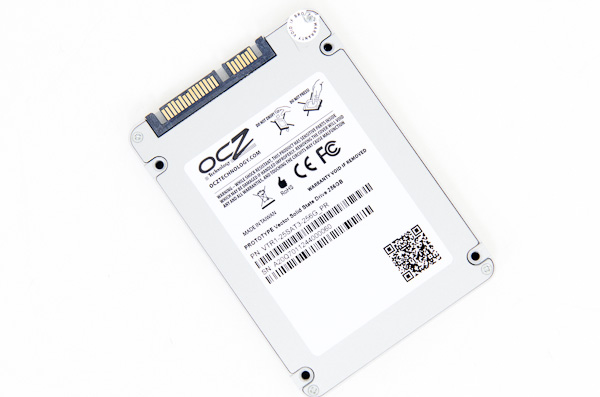








151 Comments
View All Comments
extide - Wednesday, November 28, 2012 - link
Copy Performance is tied to the block size you use when reading and writing. IE if you read 4k at a time, then write 4k at a time, you will get different performance than reading 4MB at a time and then writing 4MB. So it largely depends on the specific app you are using. Copy isnt anything special, just reads and writes.mark53916 - Thursday, November 29, 2012 - link
Maybe I should have explained more:I have found that most USB keys and many SATA SSDs perform
MUCH worse (factor of 10 and even up to more than
300 decrease in performance) when reads and writes are mixed,
rather than being a bunch of reads followed by a bunch writes.
The reads and writes can be to random locations and there still
can be a big performance it.
A feel that a simple operating system copy of a large sequential
file and a tree of a bunch of smaller files should be done since
the two tests have shown me large performance differences
between two devices that have the about the same:
. sequential read rate
. sequential write rate
. Read/second
. Writes/second
when the reads and writes aren't mixed.
I also found that HD Tune Pro File Benchmark sometimes shows
significant (factor of 10 or more) differences between the
Sequential 4 KB random single and 4 KB random multi tests.
(For my own personal use, the best benchmark seems to be
copying a tree of my own data that has about 6GB in about
25000 files and copying from one 8GB TrueCrypt virtual disk
to another on the same device. I see differences of about
15 to one between stuff that I have tested in the last year
that all show speeds limited by my 7 year old motherboards
in sequential tests and all performing much slower with the
tree copy tests.
Since the tree is my ad-hoc data and my hardware is so old
I don't expect anyone to be able to duplicate the tests, but I
have given results in USENET groups that shows that there
are large performance differences that are not obviously
related to bottlenecks or slowness of my hardware.
There could be something complicated happening that
is due, for instance, in a problem with intermixing
read and write operations on USB 3 or SATA interface
that is dependent on the device under test but not
due to an inherent problem with the device under test,
but I think that the low performance for interleaved reads
and writes is at least 90% due to the device under test
and less than 10% due to problems with mixing
operations on my hardware since some devices don't
have a hit in performance when read and write operations
are mixed and have sequential uni-directional performance
much higher than 200MB/s on SATA and up to 134MB/s
on USB 3.
There could be some timing issues caused by having
a small number of buffers (much less than 1000), only
2 CPUs, having to wait for encryption, etc., but I don't
think these add up to a factor of 4, and, as I have said,
I see performance hits of much more than 15:1
for the same device, and all I did was switch from copying
from another flash device to the flash device under test
to copying from one location on the flash device under test
to another location. on the same device. Similarly, the
HD Tune Pro File Benchmark Sequential 4 KB random single
compared to 4 KB random multi with multi 4 or more
takes a hit of up to 100 for some USB 3 flash memory keys,
whereas other flash memory keys may run about the same speed
for random single and multi as well as about the same speed for
as the poorly performing device does for 4 KB random single.
MarchTheMonth - Wednesday, November 28, 2012 - link
Anand, I just want to know what you think of as a difference with the new CEO sending a formal, official compared to the hand-written notes by Ryan. To me (an outsider), official letters bore me, as they are just a carbon copy of the same letter sent to many others.A handwritten note would mean more to me. Now, given that the handwritten note was more of a nudge, I can understand that perhaps a less "nudging" note would be more appreciated, but I digress.
Just curious.
-March
BrightCandle - Wednesday, November 28, 2012 - link
Do you have more confidence this time that OCZ is actually being honest about the contents of their controller chip? Clearly last time you were concerned about OCZ's behaviour when you reviewed the Octane (both in terms of reviewing their drives and allowing them to advertise) and they out right lied to you about the contents of the chip, they lied to everyone until they got caught.This time do you think the leopard has changed its spots or is this just business as usual for a company that cheats so frequently?
gammaray - Wednesday, November 28, 2012 - link
The real question is,Why pay for an OCZ Vector when you can get a Samsung 840 Pro for the same price??
jwilliams4200 - Thursday, November 29, 2012 - link
Very good question.Hood6558 - Wednesday, November 28, 2012 - link
If these are priced to compete with Samsung's 840 Pro, only a die-hard OCZ fanboy would buy one, since the 840 Pro beats it in almost every benchmark, and is considered the most reliable brand, while OCZ has a long, rich history of failed drives, controllers, and firmware. Even if they were priced $50 below the Samsung I wouldn't buy one, at least not until they had 6 months under their belt without major issues. It get's old re-inventing your system every time your SSD has issues.SanX - Thursday, November 29, 2012 - link
Remember that excluding typed vs handwritten letter to Anand this is still 100% Ryan Petersen in each SSDskroh - Thursday, November 29, 2012 - link
I noticed that in the consistency testing, the Intel 330 seemed to outperform just about everything except the Intel 3700. That seems like a story worth exploring! Is the 330 a sleeper user-experience bargain?jwilliams4200 - Thursday, November 29, 2012 - link
For one thing, it did not look to me like the 330 had yet reached steady-state in the graphs provided. Maybe it had, but at the point where the graph cut-off things were still looking interesting.